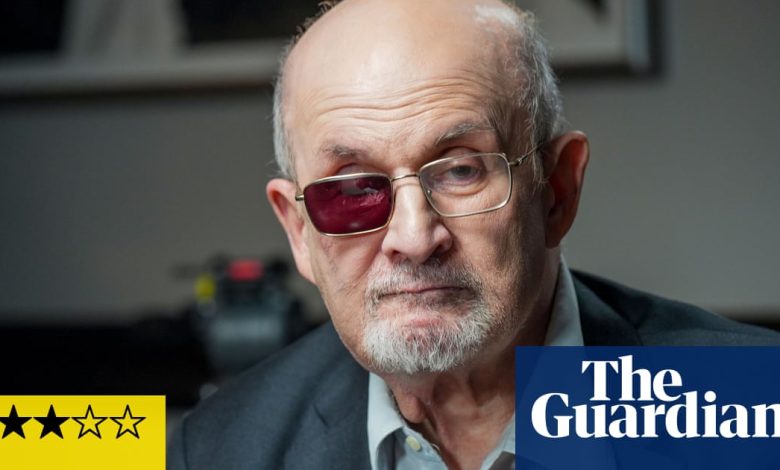Salman Rushdie: Through a Glass Darkly review – a harrowing first-person account of a knife attack | Television & radio

[ad_1]
“OhOne of the first things I thought when I saw him coming towards me was, “Oh, it’s you…” I wondered if he was going to jump out of the audience one day. When news broke in August 2022 that the novelist Salman Rushdie was stabbed by a man who stormed the stage at a literary event in Chautauqua, Pennsylvania, the impact of what happened was unique: it was shocking but not surprising. No one wondered why someone would suddenly attack an aging British-Indian writer.
Salman Rushdie: Through a Glass Darkly allows Rushdie to recall the attack in his own words, as in his new memoir, Knife. The film also fills in the backstory, although it sketches it out lightly with the assumption that viewers will already know it. In 1988, a fatwa calling for Rushdie’s assassination was imposed on him by Iran’s supreme leader, Ayatollah Khomeini, following the publication of Rushdie’s novel The Satanic Verses. Rushdie initially lived under police protection without appearing in public; gradually it reappeared as the threat supposedly subsided.
All of this was covered in the 2012 Imagine … documentary The Fatwa – The Salman Story, presented by Alan Yentob, who also hosts this new film. It includes only a few excerpts from the BBC’s material and instead focuses on the attack itself. Rushdie spoke of lying on the ground surrounded by chaos, “an impressive amount of blood all around me” before being helped by a bystander he knew only as Thumb: “My recollection is that he was a big man. He placed his big thumb over the worst wound that was on my neck. The thumb did a lot to help me.’
The 76-year-old, who lost his right eye in the attack, offers self-deprecatingly pithy descriptions of the pain of having his eyelid stitched together, of the difficulties of losing his depth perception – when water is poured now, he sometimes misses the glass – and of the extraordinary discomfort from insertion of a catheter or removal of a ventilation tube. Both recent experiences suggest the same wry advice: “If you can avoid it, avoid it.”
Rushdie is honest about the central question he had to ask himself when he set out to write The Knife: this thing had happened, it was bad, and he naturally wanted to write about it. But what was the story? What was the larger, universal insight that would make it a book worth buying and cherishing? “I’ve come to the conclusion that there are really two forces in conflict here,” says the author, explaining the answer he arrived at. “One was the power of violence… The other was the power of love. In the end, the power of love proved stronger.”
You may consider this sufficient, or you may consider it sentimental madness – though that would perhaps be a harsh judgment after watching Rushdie’s wife Eliza tearfully recall her long vigil at his bedside, followed by an exorcistic journey at the end back to the crime scene. The couple stood on the stage where the horror unfolded to prove that Salman is still standing.
The question Rushdie raises as to why the book had to exist, however, concerns this program for the book. This is not an art documentary where an artist talks about the experiences and emotions that inspired their new masterpiece. The book details the relevant experience, so the program relies heavily on Rushdie reading excerpts from it in a voice-over, over illustrative archive clips. We see the works Rushdie points to that have relevant themes, some of them literally applicable, others more oblique: the infamous eyeball-slicing effects captured in Un Chien Andalou and the blinding of Gloucester in King Lear; the threat of the blade in “Knife in the Water” and the opening up of possibility provided by the knife in “His Dark Materials”; the bargaining with death in The Seventh Seal and the relief of returning home in The Wind in the Willows.
It helps but doesn’t really emphasize Rushdie’s story or his thoughts Freedom of speech or the modern perils of being a controversial writer. These things are discussed, but not to the extent that we hear about Rushdie’s medical treatment. Through a Glass Darkly feels redundant in that sense. When not reading from the book, Rushdie often paraphrases it in his interview with Yentob. A sequence in which a chapter that imagines a conversation between Rushdie and his assailant, here represented as Rushdie talking to a digital animation of the killing knife, must surely have been less disturbing on the page. You might be better off reading the book.
after the promotion of the newsletter
[ad_2]




